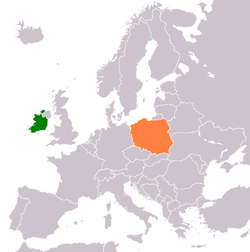 | |
Ireland | Poland |
|---|---|
Both nations are members of the Council of Europe, European Union, OECD and OSCE.
 | |
Ireland | Poland |
|---|---|
Both nations are members of the Council of Europe, European Union, OECD and OSCE.

One of the first known contacts between Ireland and Poland took place in the late 17th century when Irishman Bernard Connor was appointed physician at the court of Polish King John III Sobieski. In 1694, Connor wrote a book titled History of Poland in the English language. [1] In 1922, Ireland obtained its independence from the United Kingdom. Poland was among the first group of states to establish diplomatic relations with the independent Irish State, sending a Consul-General in 1929. [1]
Official diplomatic relations between Ireland and Poland were established in 1976. During the Cold War, relations between both nations were limited. Ireland supported the Polish Solidarity movement. In 1981, the Irish Polish Society sent 20 containers of medicines, powdered milk, baby food and clothes to Poland, valued at more than £250,000. [2] After the fall of communism in Poland, relations between both nations strengthened. In 1990, Ireland opened its embassy in Warsaw and in 1991, Poland opened its embassy in Dublin. [3] [4] In 1997, Polish President Aleksander Kwaśniewski paid an official visit to Ireland. [1] In 2003 Irish President Mary McAleese paid a visit to Poland. [5] In 2004, Poland joined the European Union and Ireland immediately opened its borders and labor market to Polish workers. [6]
Although Ireland is not a member of NATO, Irish forces have fought alongside Polish forces in the War in Afghanistan and in peacekeeping missions in Kosovo and with EUFOR (Chad).

Presidential and Prime Ministerial (Taoiseach) visits from Ireland to Poland [7] [8] [9]
Prime Ministerial and Presidential visits from Poland to Ireland [10]
Throughout the years, both nations have signed several bilateral agreements such as an Agreement on the development of economic, industrial, scientific and technological cooperation (1977); Agreement for the avoidance of double taxation and the prevention of fiscal evasion with respect to taxes on income (1995) and an Accession Treaty (2003). [11]
There are direct flights between Ireland and Poland with Ryanair. There are over 60 flights per week between both nations. [12]
Ireland is home to a Polish community totaling approximately 100,000 people.[ citation needed ] The Polish language is the most spoken foreign language in Ireland. [12]
In 2018, trade between Ireland and Poland totaled US$2.7 billion. [13] [14] Irish exports to Poland include: prepared food, dairy products, beef and drinks (mainly alcohol such as Irish whiskey). [15] Polish exports to Ireland include: ale of grain, poultry meat and beef, cakes, meat products, furs, computers, furniture, vans, juices, dairy products, confectionery and glassware. [16] More than fifty Irish companies have factories or development facilities in Poland in sectors such as ICT, print and packaging, construction and client services. Poland is Ireland's 12th-largest exports market. [8]
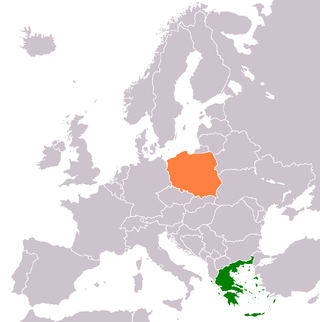
Greek-Polish relations are relations between Greece and Poland. Both countries are full members of NATO, the European Union, Three Seas Initiative, OECD, OSCE, the Council of Europe and the World Trade Organization. There are circa 4,000 people of Greek descent living in Poland, and over 20,000 people of Polish descent living in Greece. Greece has given full support to Poland's membership in the European Union and NATO.
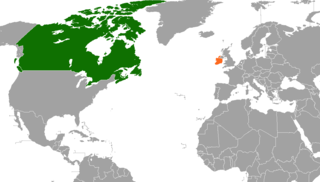
Canada and Ireland enjoy friendly relations, the importance of which centres on the history of Irish migration to Canada and the two countries' shared history as parts of the British Empire. Approximately 4.5 million Canadians – 14% of Canada's population – claimed to have Irish ancestors. Both nations are mutual members of the Organisation for Economic Co-operation and Development, United Nations and the World Trade Organization.

Diplomatic relations exist between Australia and Ireland. Australia and Ireland share a historical connection and remained part of the British Empire until their respective independence. Over 300,000 Irish settlers migrated to Australia to escape poverty in their homeland and over 2 million Australian citizens claim Irish ancestry. Both nations are mutual members of the Australia Group, Organisation for Economic Co-operation and Development and the United Nations.

France–Ireland relations refers to the bilateral relations between France and Ireland. France and Ireland are both members of the Council of Europe, European Union and the Organisation for Economic Co-operation and Development. Ireland is an associate member of La Francaphonie.

The nations of Ireland and Mexico established diplomatic relations in 1974. The relationship has been often associated with the Irish migration to Mexico. Both nations are members of the Organisation for Economic Co-operation and Development, United Nations and the World Trade Organization.

Ireland–Japan relations are the bilateral relations between Ireland and Japan. Both nations are members of the Organisation for Economic Co-operation and Development.

Ireland–Spain relations are the current and historical relations between Ireland and the Kingdom of Spain. Both states are members of the Council of Europe, the European Union, the Eurozone and the Organisation for Economic Co-operation and Development.

Israel–Poland relations comprise diplomatic relations between Israel and Poland. Israel has an embassy in Warsaw, while Poland has an embassy in Tel Aviv. The Polish ambassador to Israel is Marek Magierowski, while the newly appointed Israeli ambassador to Poland is Yacov Livne, and the charge d'affaires is Tal Ben-Ari Yaalon. Both countries are members of the Organisation for Economic Co-operation and Development, the Union for the Mediterranean and United Nations.

Poland–Uruguay relations are foreign relations between Poland and Uruguay. Neither country has a resident ambassador. Both nations are members of the United Nations.
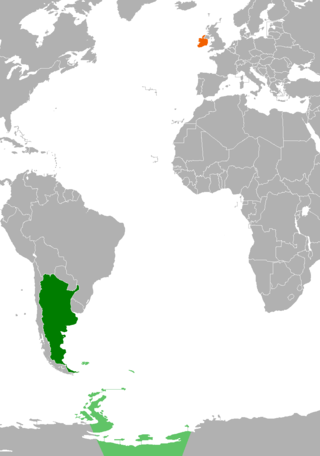
Foreign relations between the Argentine Republic and Ireland, have existed for over a century. Both nations share a history of Irish culture after over 50,000 Irish settlers migrated to Argentina. Argentina is home to the fifth largest Irish community abroad and the biggest in a non-English speaking nation. Over half a million Argentine nationals claim Irish heritage. Both nations are members of the United Nations.

Indonesia and Poland established diplomatic relations on 19 September 1955. Indonesia has an embassy in Warsaw, while Poland has an embassy in Jakarta. Other than similar red-and-white flags, Indonesia and Poland share a similar course of history through enduring revolutions, wars for independence and maintaining national unity. Both nations have agreed to expand bilateral relations in trade, culture and education sectors, through programs such as staging art exhibitions to proposing student exchange programs and provide scholarships.

The nations of Mexico and Poland first established formal diplomatic relations in 1928, however, the two states interacted non-officially before then. As early as 1519, King Sigismund I of the Polish–Lithuanian Commonwealth became aware of Mexico from messages with his envoy in Spain, Jan Dantyszek, who corresponded with Hernán Cortés during the Spanish conquest of the Aztec Empire. Several Polish migrants began to migrate to New Spain. The first waves of Polish migrants to Mexico commenced in 1830 as well as the beginning of the 20th century due to various circumstances affecting Poland at the time such as insurrections, partitions and the two World Wars.

Diplomatic relations between Brazil and Poland were first established in 1920. Over 800,000 Brazilians are of Polish descent making Brazil the second country with the largest Polish community abroad. Both nations are members of the United Nations.

Diplomatic relations exist between Australia and Poland. Over 170,000 Australian citizens are of Polish descent. Both nations are members of the Australia Group and the Organisation for Economic Co-operation and Development.

Peru–Poland relations refers to the historical and bilateral relationship between Peru and Poland. Both nations are members of the United Nations.
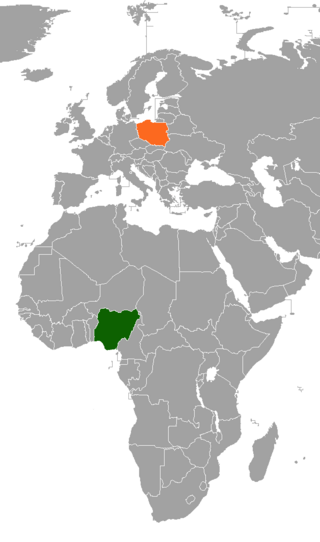
Nigeria–Poland relations are the bilateral relations between Nigeria and Poland. Both nations are members of the United Nations and the World Trade Organization.
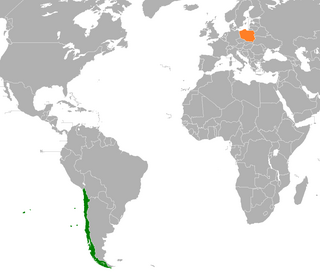
Chile and Poland maintain diplomatic relations. Both nations are members of the OECD.

Colombia–Poland relations are the diplomatic relations between Colombia and Poland. Both nations are members of the Organisation for Economic Co-operation and Development.

Norway–Poland relations are the diplomatic relations between the Kingdom of Norway and the Republic of Poland. Both nations enjoy friendly relations, the importance of which centers on mutual historical relations and the fact that more than 100,000 Polish citizens live in Norway on a permanent basis, Poles make up 2.10% of the Norwegian population. Both nations are members of the Council of Europe, Council of the Baltic Sea States, NATO, OECD, OSCE, United Nations and the World Trade Organization.

Poland–Portugal relations are the bilateral relations between the Republic of Poland and the Portuguese Republic. Both nations are members of the Council of Europe, European Union, NATO and the United Nations.